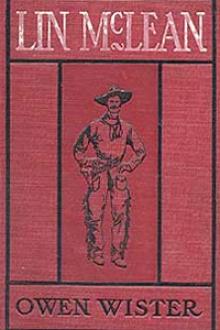The Virginian: A Horseman of the Plains, Owen Wister [best e books to read txt] 📗

- Author: Owen Wister
Book online «The Virginian: A Horseman of the Plains, Owen Wister [best e books to read txt] 📗». Author Owen Wister
“I don't always—” said Shorty, and stopped again.
The Virginian knew that he was thinking about the money he sent East. “After a while,” he continued, “I noticed a right strange fact. The money I made easy that I WASN'T worth, it went like it came. I strained myself none gettin' or spendin' it. But the money I made hard that I WAS worth, why I began to feel right careful about that. And now I have got savings stowed away. If once yu' could know how good that feels—”
“So I would know,” said Shorty, “with your luck.”
“What's my luck?” said the Virginian, sternly.
“Well, if I had took up land along a creek that never goes dry and proved upon it like you have, and if I had saw that land raise its value on me with me lifting no finger—”
“Why did you lift no finger?” cut in the Virginian. “Who stopped yu' taking up land? Did it not stretch in front of yu', behind yu', all around yu', the biggest, baldest opportunity in sight? That was the time I lifted my finger; but yu' didn't.”
Shorty stood stubborn.
“But never mind that,” said the Virginian. “Take my land away to-morrow, and I'd still have my savings in bank. Because, you see, I had to work right hard gathering them in. I found out what I could do, and I settled down and did it. Now you can do that too. The only tough part is the finding out what you're good for. And for you, that is found. If you'll just decide to work at this thing you can do, and gentle those hawsses for the Judge, you'll be having savings in a bank yourself.”
“I can make more,” said the lost dog.
The Virginian was on the point of saying, “Then get out!” But instead, he spoke kindness to the end. “The weather is freezing yet,” he said, “and it will be for a good long while. Take your time, and tell me if yu' change your mind.”
After that Shorty returned to the bunk house, and the Virginian knew that the boy had learned his lesson of discontent from Trampas with a thoroughness past all unteaching. This petty triumph of evil seemed scarce of the size to count as any victory over the Virginian. But all men grasp at straws. Since that first moment, when in the Medicine Bow saloon the Virginian had shut the mouth of Trampas by a word, the man had been trying to get even without risk; and at each successive clash of his weapon with the Virginian's, he had merely met another public humiliation. Therefore, now at the Sunk Creek Ranch in these cold white days, a certain lurking insolence in his gait showed plainly his opinion that by disaffecting Shorty he had made some sort of reprisal.
Yes, he had poisoned the lost dog. In the springtime, when the neighboring ranches needed additional hands, it happened as the Virginian had foreseen,—Trampas departed to a “better job,” as he took pains to say, and with him the docile Shorty rode away upon his horse Pedro.
Love now was not any longer snowbound. The mountain trails were open enough for the sure feet of love's steed—that horse called Monte. But duty blocked the path of love. Instead of turning his face to Bear Creek, the foreman had other journeys to make, full of heavy work, and watchfulness, and councils with the Judge. The cattle thieves were growing bold, and winter had scattered the cattle widely over the range. Therefore the Virginian, instead of going to see her, wrote a letter to his sweetheart. It was his first.
XXIV. A LETTER WITH A MORAL
The letter which the Virginian wrote to Molly Wood was, as has been stated, the first that he had ever addressed to her. I think, perhaps, he may have been a little shy as to his skill in the epistolary art, a little anxious lest any sustained production from his pen might contain blunders that would too staringly remind her of his scant learning. He could turn off a business communication about steers or stock cars, or any other of the subjects involved in his profession, with a brevity and a clearness that led the Judge to confide three-quarters of such correspondence to his foreman. “Write to the 76 outfit,” the Judge would say, “and tell them that my wagon cannot start for the round-up until,” etc.; or “Write to Cheyenne and say that if they will hold a meeting next Monday week, I will,” etc. And then the Virginian would write such communications with ease.
But his first message to his lady was scarcely written with ease. It must be classed, I think, among those productions which are styled literary EFFORTS. It was completed in pencil before it was copied in ink; and that first draft of it in pencil was well-nigh illegible with erasures and amendments. The state of mind of the writer during its composition may be gathered without further description on my part from a slight interruption which occurred in the middle.
The door opened, and Scipio put his head in. “You coming to dinner?” he inquired.
“You go to hell,” replied the Virginian.
“My jinks!” said Scipio, quietly, and he shut the door without further observation.
To tell the truth, I doubt if this letter would ever have been undertaken, far less completed and despatched, had not the lover's heart been wrung with disappointment. All winter long he had looked to that day when he should knock at the girl's door, and hear her voice bid him come in. All winter long he had been choosing the ride he would take her. He had imagined a sunny afternoon, a hidden grove, a sheltering cleft of rock, a running spring, and some words of his that should conquer her at last and leave his lips upon hers. And with this controlled fire pent up within him, he had counted the days, scratching them off his calendar with a dig each night that once or twice snapped the pen. Then, when the trail stood open, this meeting was deferred, put off for indefinite days, or weeks; he could not tell how long. So, gripping his pencil and tracing heavy words, he gave himself what consolation he could by writing her.
The letter, duly stamped and addressed to Bear Creek, set forth upon its travels; and these were devious and long. When it reached its destination, it was some twenty days old. It had gone by private hand at the outset, taken the stagecoach at a way point, become late in that stagecoach, reached a point of transfer, and waited there for the postmaster to begin, continue, end, and recover from a game of poker, mingled with whiskey. Then it once more proceeded, was dropped at the right way point, and carried by private hand to Bear Creek. The experience of this letter, however, was not at all a remarkable one at that time in Wyoming.
Molly Wood looked at the envelope. She had never before seen the Virginian's handwriting. She knew it instantly. She closed her door and sat down to read it with a beating heart.
SUNK CREEK RANCH, May 5, 188-





Comments (0)